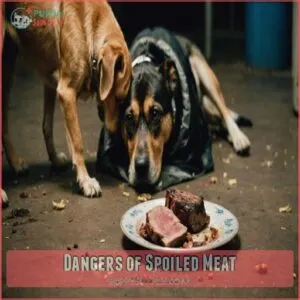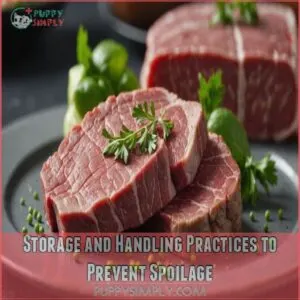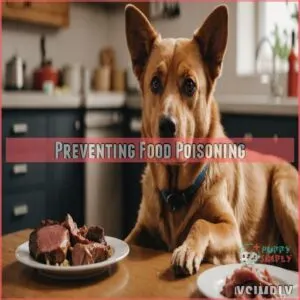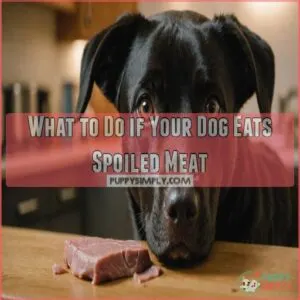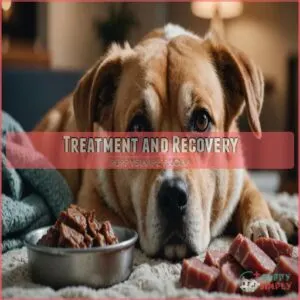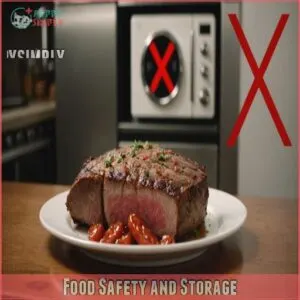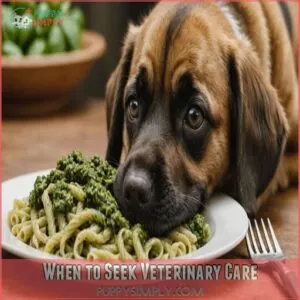This site is supported by our readers. We may earn a commission, at no cost to you, if you purchase through links.
 No, dogs can’t eat spoiled meat. It’s a recipe for disaster!
No, dogs can’t eat spoiled meat. It’s a recipe for disaster!
Spoiled meat harbors harmful bacteria like Salmonella and E. coli that can wreak havoc on your furry friend’s digestive system.
While your pup might give you those irresistible puppy eyes, don’t give in.
Feeding them spoiled meat can lead to severe food poisoning, causing vomiting, diarrhea, and even dehydration.
In some cases, it might land your pooch in the emergency vet clinic.
Always prioritize your dog’s health by providing fresh, properly stored food.
Remember, if you wouldn’t eat it, neither should your dog.
Curious about how to spot spoiled meat and keep your canine companion safe?
Table Of Contents
- Key Takeaways
- Dangers of Spoiled Meat
- Risks of Feeding Spoiled Meat
- Identifying Spoiled Meat
- Preventing Food Poisoning
- What to Do if Your Dog Eats Spoiled Meat
- Treatment and Recovery
- Special Considerations
- Food Safety and Storage
- When to Seek Veterinary Care
- Frequently Asked Questions (FAQs)
- What happens if a dog eats spoiled meat?
- What meat should I never feed my dog if they have dementia?
- Can dogs eat spoiled food?
- How to keep dogs away from spoiled meat?
- What happens if my dog eats spoiled meat?
- Is it okay to feed dogs expired meat?
- Can dogs eat meat that smells off?
- Can dogs eat meat that has been left out?
- Can feeding fresh meat prevent food poisoning?
- Are some dog breeds more sensitive?
- How does bacterial contamination occur in meat?
- What signs suggest mild versus severe poisoning?
- Can homemade remedies be harmful to dogs?
- Conclusion
Key Takeaways
- Don’t feed your dog spoiled meat; food safety experts warn that even a small amount of rotten meat can cause severe gastrointestinal distress in dogs. It’s full of harmful bacteria like Salmonella and E. coli, which can make them seriously ill.
- When it comes to feeding your dog questionable meat, it’s also crucial to remember that some seafood, like artificial crab meat found in Imitation Crab Products, can be particularly hazardous. Keep an eye out for signs like vomiting, diarrhea, and lethargy if your dog eats questionable meat, and contact a vet if symptoms worsen.
- Store your dog’s food properly and practice safe handling to prevent spoilage and cross-contamination.
- Always prioritize fresh, high-quality food for your dog, avoiding potentially toxic treats like spoiled meat or too much canned tuna in oil or brine, which can be just as hazardous as feeding tuna with high mercury levels, to avoid health risks and ensure their well-being.
Dangers of Spoiled Meat
You’ll want to think twice before letting your dog eat that questionable meat from the back of your fridge, as the same caution applies to baby back rib bones, dangers of cooked bones, as even healthy protein sources like cooked duck meat can be detrimental if spoiled. You’ll want to think twice before letting your dog eat that questionable meat from the back of your fridge, as the same caution applies to baby back rib bones, dangers of cooked bones.
Spoiled meat contains harmful bacteria like E. coli and Salmonella that can make your furry friend seriously ill, leading to symptoms ranging from upset stomach to potentially life-threatening complications.
Types of Bacteria in Spoiled Meat
The invisible enemies lurking in spoiled meat can wreak havoc on your dog’s health.
E. coli, Salmonella, Clostridium, and Staphylococcus are just a few of the bacteria that can cause serious canine foodborne illnesses.
Think of these microscopic troublemakers as unwanted dinner guests – they multiply rapidly in spoiled meat, creating toxins that lead to bacterial contamination.
Regularly checking for dog food recalls can also help protect your dog from these dangers, as seen in reports of spoiled dog food recalls.
While your pup’s stomach is tough, it’s not invincible against these harmful microorganisms.
Symptoms of Food Poisoning
Spotting spoiled meat symptoms in dogs isn’t always a walk in the park.
If your furry friend’s been nosing around bad meat, you’ll want to watch for some tell-tale signs.
If your dog is experiencing stress, diet changes, digestive issues, or an immune system imbalance, it may cause appetite loss, so check out how to get dog to eat when sick. Keep your eyes peeled for dog vomiting and diarrhea – they’re often the first red flags.
Your pup might also show appetite loss, acting like their favorite treats are yesterday’s news.
Lethargy can set in too, with your usually bouncy buddy turning into a couch potato.
Dog dehydration is another concern, so check if they’re drinking less than usual.
Severity of Food Poisoning in Dogs
Within hours of eating spoiled meat, your dog’s health can take a serious nosedive.
Factors like breed, age, and overall health determine how severely food poisoning affects your furry friend.
Small breeds often get hit harder, while larger dogs might shake it off more easily.
Here’s what you’ll need to watch for:
- Severe dehydration from persistent vomiting
- Dangerous bacterial infections like E. coli or Salmonella
- Potential organ damage if left untreated
- Life-threatening complications in puppies or senior dogs
Risks of Feeding Spoiled Meat
You’ll want to think twice before letting your dog eat that questionable meat in your fridge.
Spoiled meat can cause food poisoning in your pet, leading to symptoms ranging from mild stomach upset to severe illness that requires immediate veterinary care.
Short-term Effects on Dog Health
You’ll notice changes in your dog’s health quickly after they’ve eaten spoiled meat.
Your furry friend might start vomiting or have diarrhea within hours, making it a messy day for both of you!
Lethargy and appetite loss often follow as your pup’s canine stomach health takes a hit.
Keep an eye out for dehydration too – if they’re not drinking water, it’s time to worry.
Trust your gut – if your dog’s eating habits suddenly change, spoiled meat toxicity could be the culprit.
Long-term Effects on Dog Health
Regular exposure to spoiled meat can wreak havoc on your dog’s long-term health.
Beyond immediate tummy troubles, chronic consumption leads to serious issues affecting multiple body systems.
Your furry friend could face:
- Permanent kidney damage that silently steals their energy
- Liver issues that compromise their ability to filter toxins
- A weakened immune system, leaving them vulnerable to other illnesses
Don’t gamble with your pup’s future – stick to fresh, safe food choices for strong canine health.
Factors Influencing The Severity of Food Poisoning
Several key factors determine how sick your dog might get from spoiled meat.
Your pup’s age plays a big role – senior dogs and puppies are more vulnerable to food poisoning.
The type and amount of spoiled meat matter too, as certain bacteria pack a bigger punch.
Your dog’s overall health, immune system strength, and eating habits can also tip the scales between a minor tummy ache and a serious health crisis.
Identifying Spoiled Meat
You’ll need a keen eye and nose to spot meat that’s gone bad and could harm your dog.
Your senses are your best tools for detecting spoiled meat.
From its off-putting smell to visible signs like discoloration or unusual textures.
Signs of Spoilage in Meat
Before the first bite, knowing how to spot spoiled meat can save your pup from a nasty bout of food poisoning.
Watch for texture changes like sliminess or stickiness – these are telltale signs that bacteria’s having a field day.
If you’re preparing homemade dog food recipes online, it’s especially important to check the meat’s freshness.
Fresh meat should spring back when touched, while spoiled meat often feels mushy or tacky.
Don’t let your furry friend become a taste-tester for questionable meat!
Smell and Appearance of Spoiled Meat
Trust your nose when it comes to spotting spoiled meat – it’s your best defense against unsafe food for your furry friend.
Fresh meat should have minimal odor, while spoiled meat gives off a sour, rancid smell that’ll make you wrinkle your nose.
Watch for discoloration too – meat shouldn’t be gray, green, or sporting fuzzy patches of mold.
If the texture feels slimy or unusually sticky, that’s another red flag to toss it out.
Storage and Handling Practices to Prevent Spoilage
To keep your dog’s meat fresh, proper storage is a game-changer.
To prevent spoilage and keep your furry friend safe, follow these essential tips:
- Set your refrigerator temperature to 40°F or below
- Use the freezer for long-term storage at 0°F
- Thaw frozen meat in the fridge, never on the counter
- Check expiration dates and trust your nose – if it smells off, toss it out
Smart storage practices mean you’ll never have to worry about serving spoiled meat to your pup.
Preventing Food Poisoning
You’ll be glad to know that preventing food poisoning in your dog is easier than you might think.
By following some simple food safety practices, like proper storage and handling of meat, you can keep your furry friend safe from the dangers of spoiled food.
Safe Food Handling Practices
Most dog owners don’t realize that safe food handling is essential to prevent dog poisoning, especially when handling spoiled meat dangers.
You’ll want to keep your kitchen spotless and follow these essential practices.
Always wash your hands before handling dog food, and use separate cutting boards for raw meat.
Don’t let food sit out for more than two hours.
| Practice | Why It Matters | How To Do It |
|---|---|---|
| Hand washing | Prevents bacteria transfer | Use hot water, 20 seconds |
| Separate tools | Avoids cross-contamination | Designate dog-only items |
| Quick prep | Minimizes bacterial growth | Set a timer while cooking |
Proper Storage and Disposal of Spoiled Meat
Safety-savvy pet parents know proper meat storage prevents your furry friend from getting garbage gut.
When it comes to a sick dog’s appetite, recognizing signs of appetite loss is crucial to prevent serious health issues. You can also find more information on dog food safety products that can help you keep your pet safe. Dog Food Safety Essentials.
You’ll want to follow these important steps:
- Set your refrigerator temperature to 40°F or below
- Use freezer storage for meat you won’t cook within 2 days
- Check expiration dates religiously and toss anything questionable
- Dispose of spoiled meat in outdoor bins, never compost it
By following these guidelines, you’re keeping your pup safe from accidental snacking on spoiled surprises!
Healthy Diet Options for Dogs
However, some pet owners opt for a beagle raw dog food diet learn about the benefits and risks to provide species-appropriate nutrition, and your pup’s healthy diet starts with high-quality commercial dog food as the foundation.
Mix in fresh, properly cooked lean meats and veterinarian-approved homemade recipes for variety.
If you’re considering raw feeding, consult your vet first to avoid food poisoning risks.
Keep treat portions small, and always check for food allergies before introducing new ingredients.
Store all food properly to maintain gastrointestinal health and prevent spoilage.
What to Do if Your Dog Eats Spoiled Meat
If you’ve caught your dog snacking on spoiled meat, don’t panic – you’ll need to watch for specific symptoms and know exactly when to call your vet.
Your quick action in the next 24 hours can make all the difference in preventing serious complications, so let’s cover the essential steps you should take.
Monitoring for Symptoms
After discovering that Fido got into spoiled meat, watch closely for these warning signs of food poisoning.
Swift action could make all the difference.
- Sudden vomiting or diarrhea might signal salmonella infection
- Unusual lethargy and reluctance to move around
- Signs of dehydration like sunken eyes or dry gums
- Complete loss of appetite or refusing water
- Behavioral changes such as whimpering or aggression
Don’t wait if symptoms worsen – contact your vet immediately.
Providing Supportive Care at Home
Swift action makes all the difference when dogs consume spoiled meat.
Start by offering small amounts of water every 30 minutes to combat dehydration.
Monitor their fecal matter and energy levels closely while providing plenty of rest.
Once the vomiting stops, introduce a bland diet of rice and boiled chicken.
| Time Frame | Action Steps | Expected Response |
|---|---|---|
| First 2 Hours | Withhold food, offer water | Reduces stomach upset |
| 2-12 Hours | Monitor hydration, rest | Stabilizes condition |
| 12-24 Hours | Introduce bland diet | Supports recovery |
When to Seek Veterinary Attention
Professional care becomes a must when home remedies aren’t cutting it.
Take your dog to the vet immediately if you spot blood in their vomit, severe diarrhea won’t stop, or they’ve lost their appetite for over 24 hours.
Don’t wait around if lethargy sets in or seizures occur – these could signal serious food poisoning or aflatoxin exposure.
Remember, quick action can mean the difference between recovery and complications.
Treatment and Recovery
If your dog has eaten spoiled meat, you’ll need to follow your vet’s treatment plan carefully, which may include medication, fluid therapy, and a special diet.
You can support your pet’s recovery at home by keeping them hydrated, offering small portions of bland food when advised, and watching for any changes in their condition that might need immediate medical attention.
Veterinary Treatment Options
Veterinarians typically start treatment with IV fluids to combat dehydration in dogs who’ve eaten spoiled meat.
Your vet will administer anti-nausea meds to stop vomiting and antibiotics to fight bacterial infections.
Blood tests help determine organ function and guide treatment plans.
In severe cases, your furry friend might need additional supportive care, including prescription medication and close monitoring, to guarantee a smooth recovery.
Home Care and Recovery
Now that your furry friend‘s back from the vet, let’s get them back on their paws with some tender loving care at home.
Your role in their recovery is like being a personal nurse – monitoring and nurturing them back to health.
To help create a distraction-free zone during this recovery period, consider setting up a quiet space similar to a training environment.
- Keep fresh water available 24/7 to maintain proper hydration
- Offer small, bland meals when appetite returns
- Provide plenty of rest in a quiet, comfortable space
- Monitor their energy levels and bathroom habits closely
Preventing Future Incidents
Your kitchen can be a minefield for your furry friend. To keep your pup safe, follow these guidelines:
| Dog food storage | Safe food handling | Kitchen hygiene |
|---|---|---|
| Airtight containers | Wash hands thoroughly | Clean surfaces daily |
| Cool, dry place | Use separate utensils | Disinfect regularly |
| Check expiration dates | Cook meat thoroughly | Secure trash cans |
Remember, human food limits are key. Create a toxic food list and post it on your fridge. By staying vigilant, you’ll create a safer environment for your four-legged companion.
Special Considerations
When feeding your dog, you’ll need to think about more than just avoiding spoiled meat.
Certain health conditions, such as pancreatitis from eating high-fat foods like almonds can be triggered by human foods, food sensitivities, and toxic human foods can all impact your pet’s well-being, so it’s vital to tailor their diet accordingly.
Feeding Dogs With Pre-existing Conditions
Dogs with pre-existing conditions require extra care regarding their diet.
If your furry friend has health issues, you’ll need to be extra vigilant about what they eat.
Dietary restrictions are common for dogs with kidney disease, diabetes, or heart problems.
Work closely with your vet to develop a special diet designed for your dog’s needs.
They’ll recommend safe treats and foods that won’t exacerbate your pet’s condition.
Managing Food Allergies and Sensitivities
Managing food allergies and sensitivities requires detective work.
Keep an eye out for common allergens like beef, dairy, and wheat.
Try an elimination diet to identify triggers – it’s like solving a culinary puzzle.
Gradually reintroduce foods to pinpoint the culprit.
Consider holistic approaches, such as probiotics, to support gut health.
Treatment options range from dietary changes to medication.
Remember, what works for one pup mightn’t work for another.
Stay patient and consult your vet for personalized advice.
Avoiding Toxic Human Foods
Beyond spoiled meat, a smorgasbord of human foods can spell trouble for your furry friend, including antacids like Tums for dogs.
Chocolate hazards lurk in that forgotten candy bar, while onion dangers and garlic toxicity hide in your favorite recipes.
Don’t let grapes slip through; their risks are real.
Keep an eye out for xylitol dangers in sugar-free treats.
By knowing these toxic culprits, you’ll keep your pup safe and sound.
Food Safety and Storage
You’ll need to handle your dog’s food with as much care as you do your own. Proper storage and handling prevent spoilage, ensuring your furry friend stays healthy and happy.
Proper Storage and Handling of Dog Food
Keeping your furry friend’s chow fresh is key to their health.
Just like your own grub, dog food needs proper TLC.
Here’s how to keep those kibbles in tip-top shape:
- Store dry food in airtight containers
- Keep wet food refrigerated after opening
- Check expiration dates regularly
- Toss any food that smells off or looks moldy
Remember, proper storage temperatures are essential.
Treat your pup’s food like your own – it’s all about food safety!
Avoiding Cross-contamination
To safeguard your furry friend, you’ve got to play defense against cross-contamination.
It’s like keeping a clean house, but for your dog’s food.
Use separate cutting boards and utensils for raw meat and other ingredients.
Clean surfaces thoroughly after food prep.
Here’s a quick guide to keep things ship-shape:
| Task | Tool | Frequency |
|---|---|---|
| Wipe counters | Disinfectant spray | After each use |
| Wash utensils | Hot, soapy water | Immediately |
| Sanitize bowls | Dishwasher | Daily |
| Replace sponges | New sponge | Weekly |
Remember, a clean kitchen is a happy pup’s kitchen!
Following Manufacturer Guidelines
Manufacturers know their products best, so follow their storage guidelines to a T.
Check expiration dates religiously and pay attention to those dog food labels.
They’re not just for show!
Safe handling practices, like sealing bags tightly and storing in cool, dry places, are key to maintaining quality control.
Remember, you’re not just feeding your dog; you’re safeguarding their health with every bowl.
When to Seek Veterinary Care
Knowing when to seek veterinary care can make the difference between a minor upset and a life-threatening emergency for your dog.
You’ll need to act fast if your pet shows severe symptoms after eating spoiled meat, such as persistent vomiting, seizures, or loss of consciousness.
Emergency Situations
While proper food storage is key, emergencies can still arise.
If your dog shows signs of severe food poisoning, don’t wait – act fast!
Watch for red flags like uncontrollable vomiting, loss of consciousness, or seizures.
These symptoms demand an urgent vet visit.
Severe diarrhea that persists or contains blood is another alarm bell.
Remember, quick action in these situations could be a real lifesaver for your furry friend.
Persistent or Severe Symptoms
Don’t ignore persistent symptoms in your pup.
If vomiting or diarrhea lasts more than 24 hours, it’s time for an emergency vet visit.
It’s also essential to recognize signs of diarrhea in dogs, like acute watery, acute bloody, or chronic diarrhea, which can be caused by various factors including stress, parasites, and bacterial or viral infections, as explained in more detail about diarrhea in dogs.
Watch for signs of dehydration like sunken eyes or dry gums.
Long-term impacts of food poisoning can be serious, so don’t wait it out.
Home remedies might seem tempting, but when symptoms stick around, professional help is vital.
Trust your gut—if something feels off, seek veterinary care immediately.
Preventative Care and Check-ups
Regular check-ups are your secret weapon against potential health issues.
Annual checkups catch issues early, saving you worry and money.
Stick to a dog vaccination schedule to shield your pup from nasty bugs.
Don’t skimp on parasite prevention; those tiny critters can cause big problems.
Keep those canine chompers sparkling with proper dental care.
Tailor your furry friend’s dietary needs to their age and lifestyle.
Remember, an ounce of prevention is worth a pound of cure!
Frequently Asked Questions (FAQs)
What happens if a dog eats spoiled meat?
If your dog eats spoiled meat, they may experience food poisoning due to bacteria like Clostridium botulinum. If your dog eats spoiled meat, they may experience vomiting, diarrhea, lethargy, or dehydration.
Watch for these signs and contact a vet if they worsen.
Quick action helps prevent serious illness like botulism or food poisoning.
What meat should I never feed my dog if they have dementia?
It’s incredibly important to avoid spoiled meat!
For a dog with dementia, stick to easily digestible, high-quality options like cooked chicken or beef.
Always consult your vet for dietary advice specific to your dog’s needs.
Can dogs eat spoiled food?
Feeding dogs spoiled food can lead to severe health issues, including the risks of solanine poisoning from ingesting raw or green potatoes like green potato skins and sprouts. Feeding dogs spoiled food can lead to severe health issues, including bacterial contamination from E. coli, which can cause vomiting, diarrhea, and long-term health problems, as seen in bacterial contamination risks. Feeding dogs spoiled food isn’t a good idea; it’s a recipe for disaster.
Spoiled food can harbor harmful bacteria like Salmonella, leading to vomiting, diarrhea, and worse symptoms.
Always opt for fresh, properly stored dog food.
How to keep dogs away from spoiled meat?
Keep your curious canine away from spoiled meat by securely sealing garbage bags and using lidded trash cans.
Store perishable items properly and train your dog with commands like "leave it" to prevent scavenging mishaps.
What happens if my dog eats spoiled meat?
When your dog eats spoiled meat, it might experience vomiting, diarrhea, and lethargy due to harmful bacteria like Salmonella.
Watch for severe signs like seizures and contact a vet if symptoms persist or worsen.
Is it okay to feed dogs expired meat?
Dealing with expired meat for dogs is like walking a tightrope—you risk their health.
Even if slightly expired, meat can harbor harmful bacteria.
Stick to fresh, cooked meats to keep your pet healthy and avoid illness.
Can dogs eat meat that smells off?
If meat smells off, don’t feed it to your dog.
Even if dogs have robust stomachs, spoiled meat can harbor harmful bacteria like Salmonella or E. coli.
It’s best to err on the side of caution.
Can dogs eat meat that has been left out?
Leaving meat out might seem harmless, but for dogs, it can be a ticket to tummy troubles.
Bacteria like Salmonella can grow quickly in unrefrigerated meat, risking food poisoning.
Always make sure meat is stored properly to prevent illness.
Can feeding fresh meat prevent food poisoning?
Yes, feeding your dog fresh, cooked meat greatly reduces food poisoning risk. Always store meat properly and avoid risky foods. A healthy diet keeps your pup happy and healthy!
Are some dog breeds more sensitive?
Some dog breeds can be more sensitive, especially those with smaller stomachs or specific health issues.
Breeds like Yorkies, Bulldogs, and Dachshunds may have more dietary sensitivities, so it’s essential to watch their diet closely.
How does bacterial contamination occur in meat?
Bacterial contamination in meat happens when bacteria like Salmonella or E. coli grow due to improper handling, storage, or undercooking.
These germs can multiply quickly in warm, moist environments, leading to potentially serious health risks.
What signs suggest mild versus severe poisoning?
Mild poisoning in dogs may show as vomiting, diarrhea, and slight lethargy.
Severe poisoning includes seizures, uncontrollable drooling, and loss of consciousness.
Monitor symptoms closely and consult your vet if your dog shows severe or persistent signs.
Can homemade remedies be harmful to dogs?
It’s important to note that homemade remedies can sometimes cause harm if you’re not careful about dosages and suitability for your dog.
Always consult your vet before trying at-home treatments, as common household items can be toxic for dogs.
Conclusion
With spoiled meat, better safe than sorry.
Dogs can’t eat spoiled meat without risking serious health problems.
Keep your furry friend safe by practicing proper food storage and being mindful of what they eat.
If your dog accidentally consumes spoiled meat, watch for symptoms and seek veterinary help if needed.
Remember, prioritizing fresh, healthy food can prevent emergencies and make sure your dog stays happy and healthy.
Stay vigilant to keep your pet safe.

